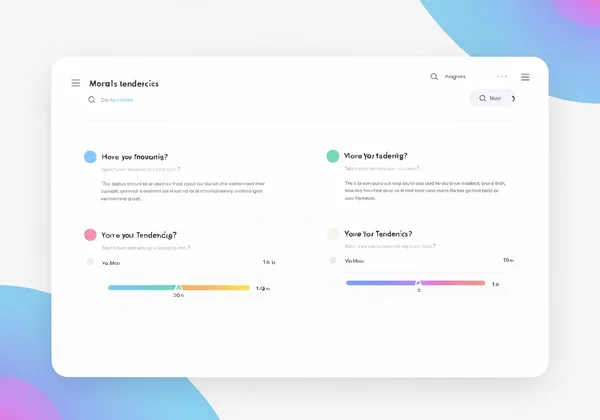แบบทดสอบคุณธรรม: เสริมสร้างการสร้างทีมและจริยธรรมความเป็นผู้นำด้วยเข็มทิศคุณธรรมของคุณ
November 11, 2025 | By Julian Croft
ในสถานที่ทำงานที่เปลี่ยนแปลงไปอย่างรวดเร็วในปัจจุบัน ทักษะทางเทคนิคและความเฉียบแหลมทางธุรกิจเป็นเพียงส่วนหนึ่งของสมการแห่งความสำเร็จเท่านั้น รากฐานที่แท้จริงขององค์กรที่ยืดหยุ่น สร้างสรรค์ และมีประสิทธิภาพสูงนั้นอยู่ที่แกนหลักทางจริยธรรม ผู้จัดการ ผู้บริหาร และผู้เชี่ยวชาญด้านทรัพยากรบุคคลเผชิญกับความท้าทายอย่างต่อเนื่องในการสร้างทีมที่เหนียวแน่นและพัฒนาผู้นำที่ประพฤติตนด้วยความซื่อสัตย์อย่างไม่เปลี่ยนแปลง ดังนั้น คุณจะค้นหาคุณธรรมและค่านิยมของทีมได้อย่างไร? คู่มือนี้จะสำรวจว่า แบบทดสอบเข็มทิศคุณธรรม ที่อิงหลักการทางวิทยาศาสตร์สามารถเป็นเครื่องมือที่ทรงพลังและนำไปปฏิบัติได้จริง เพื่อยกระดับความพยายามในการสร้างทีมของคุณ ปรับปรุงโปรแกรมการพัฒนาความเป็นผู้นำ และสร้างวัฒนธรรมการทำงานที่มีจริยธรรมอย่างแท้จริงได้อย่างไร

การเดินทางสู่ความเป็นเลิศขององค์กรเริ่มต้นด้วยความเข้าใจในตัวบุคคลซึ่งเป็นหัวใจสำคัญ ด้วยการให้ข้อมูลเชิงลึกที่ลึกซึ้งและเป็นส่วนตัว การประเมินคุณธรรมสามารถเปลี่ยนแนวคิดเชิงจริยธรรมที่เป็นนามธรรมให้เป็นกลยุทธ์ที่จับต้องได้สำหรับการเติบโต ค้นพบวิธีที่คุณสามารถปลดล็อกศักยภาพสูงสุดของทีมได้โดยเริ่มต้นด้วย แบบทดสอบคุณธรรมฟรี
ทำไมค่านิยมทางจริยธรรมในสถานที่ทำงานจึงมีความสำคัญต่อความสำเร็จของทีม
กรอบจริยธรรมที่แข็งแกร่งไม่ใช่เป็นเพียงสิ่งเสริม แต่เป็นตัวขับเคลื่อนพื้นฐานของประสิทธิภาพ นวัตกรรม และการรักษาพนักงาน เมื่อค่านิยมขององค์กรมีความชัดเจนและนำไปปฏิบัติอย่างสม่ำเสมอ จะสร้างสภาพแวดล้อมที่พนักงานรู้สึกปลอดภัย ได้รับความเคารพ และมีแรงจูงใจ ความปลอดภัยทางจิตใจนี้เป็นรากฐานที่สำคัญในการสร้างทีมที่ยอดเยี่ยม
การมีความสอดคล้องทางจริยธรรมช่วยลดความขัดแย้งในที่ทำงาน ลดความเข้าใจผิด และมอบภาษาที่ใช้ร่วมกันสำหรับการนำทางความท้าทายทางธุรกิจที่ซับซ้อน ทีมที่ดำเนินงานจากค่านิยมที่ใช้ร่วมกันจะมีความพร้อมมากขึ้นในการทำงานร่วมกันอย่างมีประสิทธิภาพ ตัดสินใจอย่างรอบคอบภายใต้แรงกดดัน และเป็นตัวแทนของแบรนด์บริษัทด้วยความจริงใจ
สร้างรากฐานของความไว้วางใจและความซื่อสัตย์สุจริต
ความไว้วางใจและความซื่อสัตย์สุจริต คือหัวใจสำคัญของธุรกิจยุคใหม่ หากไม่มีสิ่งเหล่านี้ การสื่อสารจะพังทลาย การทำงานร่วมกันจะสะดุด และการมีส่วนร่วมจะลดลง การประเมินคุณธรรมช่วยให้ทีมเข้าใจภูมิทัศน์ทางจริยธรรมโดยรวม ระบุค่านิยมร่วมกันที่สามารถเสริมสร้าง และพื้นที่ที่มีมุมมองที่หลากหลายซึ่งต้องการการอภิปรายอย่างเปิดเผย กระบวนการนี้ส่งเสริมความเคารพซึ่งกันและกันและสร้างรากฐานที่แข็งแกร่งของความไว้วางใจ ซึ่งสมาชิกในทีมสามารถพึ่งพาซึ่งกันและกันในการกระทำด้วยความสุจริตใจและรักษาคำมั่นสัญญา เมื่อความซื่อสัตย์สุจริตถูกถักทอเข้ากับโครงสร้างของทีม มันจะกลายเป็นพลังในการควบคุมตนเองเพื่อความเป็นเลิศ

เสริมสร้างการตัดสินใจเชิงจริยธรรมร่วมกันและการแก้ไขความขัดแย้ง
ในแต่ละวัน ทีมต้องเผชิญกับการตัดสินใจที่มีนัยยะทางจริยธรรม ตั้งแต่การจัดการข้อมูลลูกค้าไปจนถึงการจัดการความขัดแย้งภายใน ความเข้าใจร่วมกันในหลักการทางศีลธรรมช่วยให้ทีมสามารถมีส่วนร่วมในการ ตัดสินใจเชิงจริยธรรม ที่มีประสิทธิภาพมากขึ้น ด้วยการใช้เครื่องมือเช่น แบบทดสอบค่านิยมทางศีลธรรม ทีมสามารถนำกรอบศีลธรรมพื้นฐานของตนมาสู่พื้นผิว ความชัดเจนนี้ช่วยป้องกันความขัดแย้งที่มีรากฐานมาจากความแตกต่างของค่านิยม และมอบแนวทางที่เป็นระบบในการแก้ไขข้อขัดแย้งเมื่อเกิดข้อขัดแย้งขึ้น แทนที่จะเป็นแหล่งของความแตกแยก มุมมองทางจริยธรรมที่หลากหลายสามารถกลายเป็นจุดแข็ง นำไปสู่การแก้ปัญหาที่รอบคอบและครอบคลุมมากขึ้น
ทำความเข้าใจแนวทางแบบทดสอบคุณธรรมองค์กร
แม้ว่าแนวคิดของ แบบทดสอบคุณธรรมองค์กร อาจดูน่ากลัว แต่การประเมินสมัยใหม่ไม่ใช่เรื่องของการสอบผ่านหรือสอบตก แต่เป็นเครื่องมือที่ซับซ้อนสำหรับการค้นพบ ซึ่งออกแบบมาเพื่อ ให้ความกระจ่าง มากกว่าการตัดสิน พวกเขาให้ มุมมอง ที่เป็นความลับและเป็นกลาง ซึ่งบุคคลและทีมสามารถสำรวจแนวโน้มทางจริยธรรมของตนได้
การประเมินเหล่านี้ก้าวข้ามแบบทดสอบบุคลิกภาพที่เรียบง่าย เพื่อนำเสนอข้อมูลเชิงลึกที่ลึกซึ้งและมีพื้นฐานทางวิทยาศาสตร์ ด้วยการใช้สถานการณ์ที่ละเอียดอ่อน พวกเขาเปิดเผย "เหตุผล" เบื้องหลังทางเลือกของเรา ช่วยส่งเสริมวัฒนธรรมแห่งความอยากรู้อยากเห็นและการปรับปรุงอย่างต่อเนื่อง แทนที่จะเป็นวัฒนธรรมของการปฏิบัติตามและหวาดกลัว
แบบทดสอบเข็มทิศคุณธรรมคืออะไร และเผยข้อมูลเชิงลึกได้อย่างไร
แบบทดสอบเข็มทิศคุณธรรม คือการประเมินที่มีโครงสร้างซึ่งออกแบบมาเพื่อจัดทำแผนผังกรอบจริยธรรมของแต่ละบุคคล แบบทดสอบคุณธรรม ของเราได้รับการพัฒนาโดยทีมผู้เชี่ยวชาญจากหลากหลายสาขาของนักจริยธรรม นักจิตวิทยา และผู้เชี่ยวชาญด้าน AI โดยนำเสนอสถานการณ์ที่กระตุ้นความคิดซึ่งท้าทายการใช้เหตุผลเชิงจริยธรรมของผู้ใช้ จากนั้นอัลกอริทึมขั้นสูงของแพลตฟอร์มจะวิเคราะห์คำตอบตามแบบจำลองทางจริยธรรมและจิตวิทยาที่กำหนดไว้ ผลลัพธ์ที่ได้คือรายงานส่วนบุคคลที่เน้นแนวโน้มทางศีลธรรมที่สำคัญ รูปแบบการตัดสินใจ และค่านิยมหลัก นี่ไม่ใช่การติดป้ายว่าผู้คนเป็น "ดี" หรือ "ไม่ดี" แต่เป็นการให้แผนที่โดยละเอียดของเข็มทิศทางจริยธรรมที่เป็นเอกลักษณ์ของพวกเขา คุณสามารถ สำรวจการประเมินของเรา เพื่อดูว่ามันทำงานอย่างไร

ประโยชน์ของข้อมูลเชิงลึกด้านจริยธรรมส่วนบุคคลสำหรับองค์กร
พลังที่แท้จริงของแบบทดสอบคุณธรรมอยู่ที่ ข้อมูลเชิงลึกด้านจริยธรรมส่วนบุคคล ที่สร้างขึ้น สำหรับองค์กร ประโยชน์เหล่านี้ ครอบคลุมหลายด้าน ในระดับบุคคล พนักงานได้รับความตระหนักรู้ในตนเองอย่างลึกซึ้ง ซึ่งเป็นก้าวแรกสู่การเติบโตส่วนบุคคลและอาชีพ สำหรับทีม ข้อมูลเชิงลึกเหล่านี้เป็นพื้นฐานที่ไม่ตัดสินสำหรับการสนทนาเกี่ยวกับค่านิยมและการทำงานร่วมกัน สำหรับองค์กรโดยรวม ข้อมูลรวมที่ไม่ระบุตัวตนสามารถเปิดเผยวัฒนธรรมทางจริยธรรมโดยรวม เน้นจุดแข็งที่ควรเฉลิมฉลอง และจุดบอดที่อาจเกิดขึ้นเพื่อแก้ไขผ่านการฝึกอบรมและ การพัฒนาที่ตรงเป้าหมาย
การบูรณาการการประเมินคุณธรรมเพื่อการสร้างทีมที่มีประสิทธิภาพ
การสร้างทีมจะมีประสิทธิภาพสูงสุดเมื่อก้าวข้ามกิจกรรมผิวเผินและจัดการกับพลวัตหลักของการทำงานร่วมกัน การบูรณาการ แบบทดสอบคุณธรรม เข้ากับกลยุทธ์การสร้างทีมของคุณสามารถสร้างผลกระทบที่ลึกซึ้งและยั่งยืน เปลี่ยนกลุ่มบุคคลให้เป็นหน่วยที่เหนียวแน่นและสอดคล้องกันอย่างแท้จริง
ด้วยการเริ่มต้นด้วยความเข้าใจร่วมกันเกี่ยวกับมุมมองทางจริยธรรมของกันและกัน ทีมสามารถมีส่วนร่วมในการทำงานร่วมกันที่มีความหมายและมีประสิทธิผลมากขึ้น แนวทางนี้ส่งเสริมวัฒนธรรมที่การสนทนาอย่างเปิดเผยเกี่ยวกับค่านิยมไม่เพียงแต่ได้รับการสนับสนุน แต่ยัง ได้รับการเฉลิมฉลอง
ส่งเสริมการจัดแนวคุณธรรมและความสามัคคีของกลุ่ม
การบรรลุ การมีความสอดคล้องทางคุณธรรมของกลุ่ม ไม่ได้หมายความว่าทุกคนต้องคิดเหมือนกัน แต่หมายความว่าทีมเข้าใจและเคารพมุมมองทางจริยธรรมที่หลากหลาย ในขณะเดียวกันก็รวมตัวกันรอบค่านิยมหลักที่ใช้ร่วมกัน การใช้แบบทดสอบคุณธรรมเป็นแบบฝึกหัดของทีมช่วยให้สมาชิกเห็นว่าค่านิยมของพวกเขามาบรรจบกันและแตกต่างกันอย่างไรในสภาพแวดล้อมที่ปลอดภัยและมีโครงสร้าง ความรู้นี้สร้างความเห็นอกเห็นใจและเสริมสร้าง ความสามัคคี เนื่องจากสมาชิกในทีมเรียนรู้ที่จะชื่นชมมุมมองที่แตกต่างกันและ นำความหลากหลายนั้นมาใช้ให้เกิดประโยชน์ เพื่อการตัดสินใจที่ดีขึ้นและรอบด้านมากขึ้น
การออกแบบสถานการณ์เชิงจริยธรรมสำหรับเวิร์กช็อปทีมที่กระตุ้นการมีส่วนร่วม
ข้อมูลเชิงลึกจากแบบทดสอบคุณธรรมเป็นจุดเริ่มต้นที่สมบูรณ์แบบสำหรับ เวิร์กช็อปทีมที่กระตุ้นการมีส่วนร่วมและมีชีวิตชีวา หลังจากที่สมาชิกในทีมทำการประเมินส่วนบุคคลแล้ว ผู้อำนวยความสะดวกสามารถนำการอภิปรายเกี่ยวกับ สถานการณ์เชิงจริยธรรม ที่ออกแบบมาโดยเฉพาะซึ่งเกี่ยวข้องกับอุตสาหกรรมหรือบทบาทเฉพาะของพวกเขา ตัวอย่างเช่น ทีมการตลาดสามารถอภิปรายประเด็นขัดแย้งเกี่ยวกับการปกป้องข้อมูล ในขณะที่ทีมขายสามารถจัดการกับสถานการณ์เกี่ยวกับการกำหนดราคาที่โปร่งใส การประยุกต์ใช้ในทางปฏิบัตินี้เปลี่ยนข้อมูลเชิงลึกทางทฤษฎีให้เป็นทักษะในทางปฏิบัติ ทำให้ทีมมีความมั่นใจในการรับมือกับความท้าทายทางจริยธรรมในโลกจริงร่วมกัน การทำ แบบทดสอบคุณธรรมออนไลน์ คือขั้นตอนแรก
ใช้แบบทดสอบคุณธรรมเพื่อการพัฒนาความเป็นผู้นำที่แข็งแกร่ง
ความเป็นผู้นำที่มีประสิทธิภาพ เป็นสิ่งเดียวกันกับ ความเป็นผู้นำเชิงจริยธรรม เข็มทิศคุณธรรมของผู้นำ กำหนดบรรยากาศ สำหรับทั้งทีม และท้ายที่สุดคือองค์กร ดังนั้น องค์ประกอบหลักของโปรแกรม การพัฒนาความเป็นผู้นำ ที่แข็งแกร่งใด ๆ จะต้องเป็นการปลูกฝังการตระหนักรู้ในตนเองเชิงจริยธรรมและความกล้าหาญ
แบบทดสอบคุณธรรมทำหน้าที่เป็นกระจกเงาอันทรงพลังสำหรับผู้นำ เผยให้เห็นรูปแบบการตัดสินใจโดยธรรมชาติ อคติที่อาจเกิดขึ้น และค่านิยมหลักของพวกเขา ความรู้นี้ช่วยให้พวกเขานำด้วยความจริงใจ ความสม่ำเสมอ และความซื่อสัตย์สุจริตมากขึ้น
ปลูกฝังการตระหนักรู้ในตนเองเพื่อความเป็นผู้นำเชิงจริยธรรม
ความเป็นผู้นำเชิงจริยธรรม เริ่มต้น ที่การตระหนักรู้ในตนเอง ผู้นำที่ไม่เข้าใจสิ่งกระตุ้นทางศีลธรรมและ จุดที่มองข้าม ของตนเองไม่สามารถเป็นผู้นำได้อย่างมีประสิทธิภาพ แบบทดสอบเข็มทิศคุณธรรมมอบรายงานที่เป็นความลับและขับเคลื่อนด้วยข้อมูลเกี่ยวกับแนวโน้มทางจริยธรรมของผู้นำ สิ่งนี้ช่วยให้พวกเขาไตร่ตรองคำถามเช่น: ฉันตอบสนองอย่างไรภายใต้ความกดดัน? ฉันให้ความสำคัญกับค่านิยมใดในภาวะวิกฤต? การกระทำของฉันสอดคล้องกับหลักการที่ฉันระบุไว้หรือไม่? การไตร่ตรองตนเองอย่างลึกซึ้งนี้เป็นสิ่งจำเป็นสำหรับการสร้างความจริงใจและความต่อเนื่องที่สร้างแรงบันดาลใจให้เกิดความไว้วางใจและความภักดีจากทีมของพวกเขา

กลยุทธ์ในการส่งเสริมความรับผิดชอบและความกล้าหาญทางคุณธรรม
ด้วยความรู้ในตนเอง ผู้นำสามารถพัฒนากลยุทธ์ที่เป็นรูปธรรมเพื่อส่งเสริมวัฒนธรรมแห่ง ความรับผิดชอบ และ ความกล้าหาญทางคุณธรรม ซึ่งเกี่ยวข้องกับการสร้างสภาพแวดล้อมที่พนักงานรู้สึกปลอดภัยทางจิตใจที่จะแสดงความกังวลด้านจริยธรรมโดยไม่ต้องกลัว ผลกระทบเชิงลบ ผู้นำที่เข้าใจกรอบคุณธรรมของตนเองจะมีความพร้อมมากขึ้นในการรับรู้และ ส่งเสริมและสนับสนุน พฤติกรรมเชิงจริยธรรมในผู้อื่น พวกเขาสามารถใช้ข้อมูลเชิงลึกนี้เพื่อเป็นที่ปรึกษาแก่สมาชิกในทีม อำนวยความสะดวกในการสนทนาที่ยากลำบาก และเป็นแบบอย่างของความกล้าหาญที่จำเป็นในการตัดสินใจที่ถูกต้อง แม้ว่าจะเป็นการตัดสินใจที่ยากลำบากก็ตาม
สร้างสถานที่ทำงานที่แข็งแกร่งและมีจริยธรรมมากขึ้นในวันนี้
การสร้างสถานที่ทำงานที่มีจริยธรรมและมีความไว้วางใจสูงเป็นหนึ่งในการลงทุนที่มีค่าที่สุดที่องค์กรสามารถทำได้ นำไปสู่ทีมที่แข็งแกร่งขึ้น ผู้นำที่แท้จริงมากขึ้น และความสำเร็จที่ยั่งยืน การเดินทางเริ่มต้นด้วยความเข้าใจ – ความเข้าใจในตนเอง ทีมของคุณ และผู้นำของคุณในระดับจริยธรรมที่ลึกซึ้งยิ่งขึ้น
แพลตฟอร์มนี้เสนอ แบบทดสอบคุณธรรม ที่ได้รับการตรวจสอบทางวิทยาศาสตร์และเป็นความลับอย่างสมบูรณ์เพื่อเริ่มต้นการเดินทางนี้ เสริมพลังให้ผู้คนของคุณด้วยการตระหนักรู้ในตนเองที่พวกเขาต้องการเพื่อความเจริญรุ่งเรือง
พร้อมที่จะสร้างทีมที่ดีขึ้นและพัฒนาผู้นำที่แข็งแกร่งขึ้นแล้วหรือยัง? ทำแบบทดสอบคุณธรรม วันนี้และค้นพบแกนหลักทางจริยธรรมขององค์กรของคุณ
คำถามที่พบบ่อยเกี่ยวกับการทดสอบคุณธรรมขององค์กร
แบบทดสอบคุณธรรมพื้นฐานสำหรับมืออาชีพคืออะไร?
แบบทดสอบคุณธรรมพื้นฐาน สำหรับมืออาชีพไม่ใช่การสอบผ่าน/ตก แต่เป็นเครื่องมือในการพัฒนา โดยใช้สถานการณ์ที่สมจริงและเกี่ยวข้องกับงาน เพื่อช่วยให้บุคคลระบุค่านิยมทางศีลธรรมหลักและรูปแบบการตัดสินใจของตนเอง เป้าหมายคือการให้ข้อมูลเชิงลึกที่เป็นกลางซึ่งส่งเสริมการตระหนักรู้ในตนเองและเปิดการสนทนาที่สร้างสรรค์เกี่ยวกับจริยธรรมในสถานที่ทำงาน
ฉันจะระบุค่านิยมหลักในสถานที่ทำงานสำหรับทีมของฉันได้อย่างไร?
การระบุค่านิยมหลักในสถานที่ทำงานเริ่มต้นด้วยการทำความเข้าใจบุคคลในทีมของคุณ เครื่องมือเช่น แบบทดสอบรากฐานทางศีลธรรม สามารถเป็นจุดเริ่มต้นที่ขับเคลื่อนด้วยข้อมูล โดยเปิดเผยหลักการทางจริยธรรมร่วมกันที่มีอยู่แล้วภายในกลุ่ม จากนั้นคุณสามารถจัดเวิร์กช็อปเพื่อหารือเกี่ยวกับผลลัพธ์เหล่านี้ และร่วมกันกำหนดชุดค่านิยมหลักที่ทุกคนรู้สึกเชื่อมโยงด้วย สำรวจค่านิยมของทีมคุณด้วย แบบทดสอบเข็มทิศจริยธรรม ของเรา
แบบทดสอบคุณธรรมสามารถปรับปรุงพลวัตของทีมและประสิทธิภาพการทำงานได้อย่างแท้จริงหรือไม่?
ใช่ อย่างแน่นอน แบบทดสอบคุณธรรมช่วยปรับปรุงพลวัตของทีมโดยการสร้างรากฐานของความไว้วางใจ ความเห็นอกเห็นใจ และความเคารพซึ่งกันและกัน เมื่อสมาชิกในทีมเข้าใจมุมมองทางจริยธรรมของกันและกัน การสื่อสารจะชัดเจนขึ้นและลดความขัดแย้ง ความปลอดภัยทางจิตใจที่เพิ่มขึ้นนี้ส่งผลโดยตรงต่อการมีส่วนร่วมที่สูงขึ้น การทำงานร่วมกันที่ดีขึ้น และท้ายที่สุดคือประสิทธิภาพการทำงานที่เพิ่มขึ้น
แบบทดสอบเข็มทิศคุณธรรมเหมาะสำหรับผู้นำทุกระดับภายในองค์กรหรือไม่?
ใช่ แบบทดสอบเข็มทิศคุณธรรม มีคุณค่าสำหรับผู้นำทุกระดับ ตั้งแต่หัวหน้างานใหม่ไปจนถึงผู้บริหารระดับสูง การตระหนักรู้ในตนเองเชิงจริยธรรมเป็นทักษะที่สำคัญสำหรับทุกคนในตำแหน่งที่มีอิทธิพล สำหรับผู้นำที่กำลังเติบโต มันสร้างรากฐานที่แข็งแกร่งสำหรับอาชีพของพวกเขา สำหรับผู้บริหารระดับสูง มันเป็นโอกาสในการปรับปรุงรูปแบบความเป็นผู้นำของพวกเขา และเพื่อให้แน่ใจว่าการกระทำของพวกเขาสอดคล้องกับค่านิยมที่ระบุไว้ขององค์กรอย่างสม่ำเสมอ